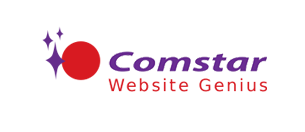You probably know right where to go to find your business or organization’s most critical assets, such as its articles of incorporation or business license. Or who to go to for a record of depreciating assets, like office furniture, computers or vehicles. Whether you are a one-person shop or have a team of people, you need to know that your assets are in good hands to enjoy a good night’s sleep.
Do you consider your web presence an asset?
At Comstar, where we provide our clients with any and all web-related services, we’ve seen many situations where someone’s lack of knowledge about their website has resulted in scenarios ranging from a website and email services being temporarily “down” to the disaster of a registered domain being permanently lost. It usually happens because there can be many components to an organization’s web presence and their assets are spread out across way too many providers.
Do you know where your web assets are?
Even more basic, do you know what your web assets are?
Your web assets are everything from your domain registration down to the contents of your website. Some assets are basic and universal.
- Domain Registration: This is the first and most important web asset you have – your website address and where your organization’s email is sent. Without this component all else is worthless. If you aren’t paying attention it can expire and you can lose it.
Tip: Know where your domain is registered and make sure the contact information associated with your record is accurate and directed to the person(s) responsible in you own organization, so that notices of such critical things like domain expiration are received. - Domain Name System (DNS): While not typically considered an asset, it’s important to know where to go to make changes to your basic web services, like where your website or email is hosted. Depending on your provider, it may take up to 72 hours for any change to be effective.
Tip: Choose a provider that is accessible. and contact them well ahead of any changes you want to make. Some providers offer no option for faster service, some make the changes for you, while others provide a dashboard or cPanel for making them yourself. - Hosting Web Server(s): Typically, these hardware and software systems that run your site are not actually your asset, but probably your ISP’s. The web files that make up your site should be yours: programming, copy, photo, images, videos, etc. By “should be” I mean, make sure you do own them. If you ever want to move your site to another ISP you’ll need them.
Tip: Choose a web developer/ hosting provider who can assure you that you have full ownership rights to your web files, so you can make choices about where your site is hosted. You don’t want your website choices limited by actual possession of your web files. Making your own periodic offsite backup of your web files is a good idea. - Email Services: Your organization’s email may be hosted at your ISP, along with your website. You may have an exchange server of your own. Additional related services, like spam and anti-virus filters can add another layer of complexity.
Tip: No matter where your email is hosted, be sure you have an excellent spam and virus filter and that your email server is secure against attacks by the bad actors of the world.
